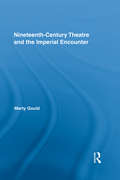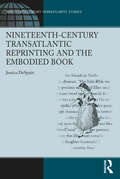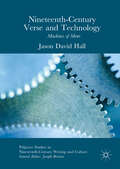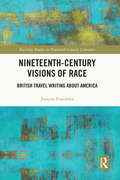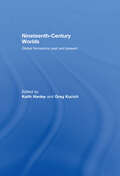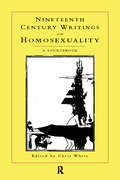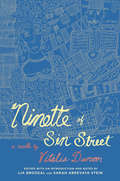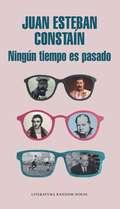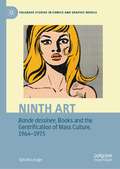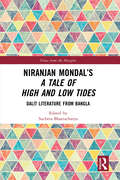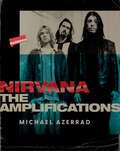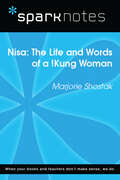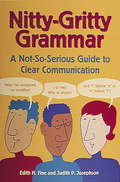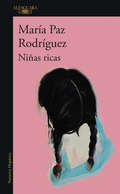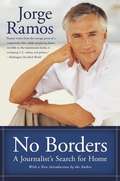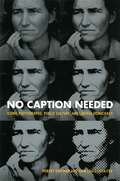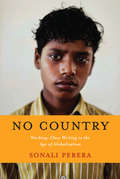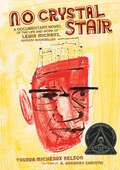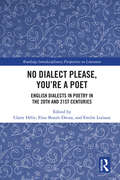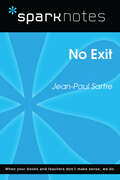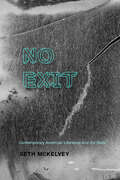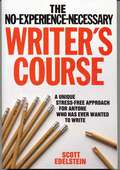- Table View
- List View
Nineteenth-Century Theatre and the Imperial Encounter (Routledge Advances in Theatre & Performance Studies)
by Marty GouldIn this study, Gould argues that it was in the imperial capital’s theatrical venues that the public was put into contact with the places and peoples of empire. Plays and similar forms of spectacle offered Victorian audiences the illusion of unmediated access to the imperial periphery; separated from the action by only the thin shadow of the proscenium arch, theatrical audiences observed cross-cultural contact in action. But without narrative direction of the sort found in novels and travelogues, theatregoers were left to their own interpretive devices, making imperial drama both a powerful and yet uncertain site for the transmission of official imperial ideologies. Nineteenth-century playwrights fed the public’s interest in Britain’s Empire by producing a wide variety of plays set in colonial locales: India, Australia, and—to a lesser extent—Africa. These plays recreated the battles that consolidated Britain’s hold on overseas territories, dramatically depicted western humanitarian intervention in indigenous cultural practices, celebrated images of imperial supremacy, and occasionally criticized the sexual and material excesses that accompanied the processes of empire-building. An active participant in the real-world drama of empire, the Victorian theatre produced popular images that reflected, interrogated, and reinforced imperial policy. Indeed, it was largely through plays and spectacles that the British public vicariously encountered the sights and sounds of the distant imperial periphery. Empire as it was seen on stage was empire as it was popularly known: the repetitions of character types, plot scenarios, and thematic concerns helped forge an idea of empire that, though largely imaginary, entertained, informed, and molded the theatre-going British public.
Nineteenth-Century Transatlantic Reprinting and the Embodied Book (Ashgate Series in Nineteenth-Century Transatlantic Studies)
by Jessica DeSpainUntil the Chace Act in 1891, no international copyright law existed between Britain and the United States, which meant publishers were free to edit text, excerpt whole passages, add new illustrations, and substantially redesign a book's appearance. In spite of this ongoing process of transatlantic transformation of texts, the metaphor of the book as a physical embodiment of its author persisted. Jessica DeSpain's study of this period of textual instability examines how the physical book acted as a major form of cultural exchange between Britain and the United States that called attention to volatile texts and the identities they manifested. Focusing on four influential works”Charles Dickens's American Notes for General Circulation, Susan Warner's The Wide, Wide World, Fanny Kemble's Journal of a Residence on a Georgian Plantation, and Walt Whitman's Democratic Vistas”DeSpain shows that for authors, readers, and publishers struggling with the unpredictability of the textual body, the physical book and the physical body became interchangeable metaphors of flux. At the same time, discourses of destabilized bodies inflected issues essential to transatlantic culture, including class, gender, religion, and slavery, while the practice of reprinting challenged the concepts of individual identity, personal property, and national identity.
Nineteenth-Century Verse and Technology
by Jason David HallThis book repositions thinking about rhythm, meter and versification during the “Mechanical Age.” Cutting across disciplinary boundaries, the book examines the rhythmical workings of poems alongside not only Victorian theories of prosody and poetics but also contemporary thinking about labor practices, pedagogical procedures, scientific experiments, and technological innovations. By offering an exploded definition of meter—one that extends beyond conventional foot-based scansion—this book explicates the conceptual and, at times, material exchanges between poetic meter and machine culture. The machines of meter include mid-century theories of abstraction and technologies of smoothness and even spacing; a deeply influential, though rarely credited, system of metrical manufacture; verse produced by a Victorian automaton; the mechanics of the human body and mind and the meters that issued from them; and the promise of scientific machines to resolve metrical dilemmas once and for all.
Nineteenth-Century Visions of Race: British Travel Writing about America (Routledge Studies in Nineteenth Century Literature)
by Justyna FruzińskaNineteenth-Century Visions of Race: British Travel Writing about America concerns the depiction of racial Others in travel writing produced by British travelers coming to America between 1815 and 1861.The travelers’ discussions of slavery and of the situation of Native Americans constituted an inherent part of their interest in the country’s democratic system, but it also reflected numerous additional problems: 19th-century conceptions of race, the writers’ own political agendas, as well as their like or dislike of America in general, which impacted how they assessed the treatment of the subaltern groups by the young republic. While all British travelers were critical of American slavery and most of them expressed sympathy for Native Americans, their attitude towards non-whites was shaped by prejudices characteristic of the age. The book brings together descriptions of blacks and Native Americans, showing their similarities stemming from 19th-century views on race as well as their differences; it also focuses on the depiction of race in travel writing as part of Anglo-American relations of the period.
Nineteenth-Century Worlds: Global formations past and present
by Keith Hanley Greg KucichThis volume assembles a wide range of studies that together provide—through their interdisciplinary range, international scope, and historical emphases—an original scholarly exploration of one of the most important topics in recent nineteenth-century studies: the emergence in the nineteenth century of forms of global experience that have developed more recently into rapidly expanding processes of globalization and their attendant collisions of race, religion, ethnicity, population groups, natural environments, national will and power. Emphasizing such links between global networks past and present, the essays in this volume engage with the latest work in postcolonial, cosmopolitan, and globalization theory while speaking directly to the most pressing concerns of contemporary geopolitics. Each essay examines specific cultural and historical circumstances in the formation of nineteenth-century worlds from a range of disciplinary perspectives, including economics, political history, natural history, philosophy, the history of medicine and disease, religious studies, literary criticism, art history, and colonial studies. Detailed in their particular modes of analysis yet integrated into a collective conversation about the nineteenth century’s profound impact on our present worlds, these inquiries also explore the economic, political, and cultural determinants on nineteenth-century types of transnational experience as interweaving forces creating new material frameworks and conceptual models for comprehending major human categories—such as race, gender, subjectivity, and national identity—in global terms. As nineteenth-century global intersections differ in important ways from the shapes of globalization today, however, the essays in this volume generate new ways of understanding emergent patterns of worldwide experience in the age of imperialism and thereby stimulate fresh insights into the dynamics of global formations and conflicts today.
Nineteenth-Century Writings on Homosexuality: A Sourcebook
by Chris WhiteNineteenth-Century Writings on Homosexuality is a comprehensive collection which provides, for the first time in one volume, many texts unavailable outside specialised academic libraries. Chris White has brought together a wide range of primary source material, including prose, poetry, fiction, history and polemic from 1810 to 1914. Nineteenth-Century Writings on Homosexuality includes writing on: * trials and scandals * censorship and homophobia * cultural and personal history * love and friendship * lesbianism * aestheticism and decadence * sexual tourism and colonialism * cross-class desire * sodomy and sadomasochism. Containing a general introduction, section headnotes, a bibliography of primary and secondary source material, this book is extraordinarily well researched.
Ninette of Sin Street
by Sarah Abrevaya Stein Jane Kuntz Lia Brozgal Vitalis DanonPublished in Tunis in 1938, Ninette of Sin Street is one of the first works of Tunisian fiction in French. Ninette's author, Vitalis Danon, arrived in Tunisia under the aegis of the Franco-Jewish organization the Alliance Israélite Universelle and quickly adopted—and was adopted by—the local community. Ninette is an unlikely protagonist: Compelled by poverty to work as a prostitute, she dreams of a better life and an education for her son. Plucky and street-wise, she enrolls her son in the local school and the story unfolds as she narrates her life to the school's headmaster. Ninette's account is both a classic rags-to-riches tale and a subtle, incisive critique of French colonialism. That Ninette's story should still prove surprising today suggests how much we stand to learn from history, and from the secrets of Sin Street. This volume offers the first English translation of Danon's best-known work. A selection of his letters and an editors' introduction and notes provide context for this cornerstone of Judeo-Tunisian letters.
Ningún tiempo es pasado
by Juan Esteban ConstainCompendio de algunos de los mejores ensayos y columnas de Juan Esteban Constaín <P><P> Ningún tiempo es pasado reúne varios ensayos y columnas de Juan Esteban Constaín sobre temas tan diversos como la primera guerra mundial, el Día D, el asesinato de Rafael Uribe Uribe, la batalla de Waterloo, el viaje de Humboldt a Colombia, la vida cultural del Café Windsor, la locura de Syd Barrett (el mítico fundador de Pink Floyd) y la notable obra crítica de Hernando Téllez. <P><P>Historia de Colombia y del mundo, cercana y remota; poetas, novelistas, críticos literarios; música, fútbol, cine, ciudades, todo esto hace parte de este variopinto compendio sembrado de anécdotas, datos y reflexiones sorprendentes, en el estilo tan único, y tan grato, de su autor.
Ninth Art. Bande dessinée, Books and the Gentrification of Mass Culture, 1964-1975 (Palgrave Studies in Comics and Graphic Novels)
by Sylvain LesageIn France, comics are commonly referred to as the "ninth art". What does it mean to see comics as art? This book looks at the singular status of comics in the French cultural landscape. Bandes dessinées have long been published in French newspapers and magazines. In the early 1960s, a new standard format emerged: large hardback books, called albums. Albums played a key role in the emergence of the ninth art and its acceptance among other forms of literary narrative. From Barbarella in 1964 to La Ballade de la mer salée in 1975, from Astérix and its million copies to Tintin and its screen versions, within the space of just a few years the comics landscape underwent a deep transformation.The album opened up new ways of creating, distributing, and reading bandes dessinées. This shift upended the market, transformed readership, initiated new transmedia adaptations, generated critical discourse, and gave birth to new kinds of comics fandom. These transformations are analysed through a series of case studies, each focusing on a noteworthy album. By retracing the publishing and critical history of these classic bandes dessinées, this book questions the blind spots of a canon based on the album format and uncovers the legitimisation processes that turned bande dessinée into the ninth art.
Niranjan Mondal’s A Tale of High and Low Tides: Dalit Literature from Bangla (Voices from the Margins)
by Sucheta BhattacharyaNiranjan Mondal is one of the most prolific writers of Dalit literature in Bangla known for his immersive fictions that root themselves in the lives of people from the Sundarbans, the mangrove forest in east India. This volume of the translation of his novel, A Tale of High and Low Tides (Ujaan Bhatir Kathokata), along with critical essays and an interview of the author, introduces his work to a new readership.Mondal’s writings highlight the unique lived experiences of the inhabitants of the Sundarbans and are meditative explorations of the links between caste and expression, nature and human life, and the ‘centre’ and the ‘margin’. This book creates a dialogue between the body of literature that is visible and that which is not, as well as between biography and literature. Mondal’s own views on contemporary life, society, and literature—both mainstream and marginalized—will help readers understand the relationship between literature and its social context. The volume creates an academic framework within which Mondal’s fiction can be read, appreciated and critically analysed.Part of the Voices from the Margins series, this critical edition will be an important resource for students of literature, comparative literature, modern Indian literature, translation studies, minority studies, Dalit studies, and gender studies. It will also be of interest to those engaged in contemporary Indian/South Asian literary cultures, social sciences, history and sociology.
Nirvana: The Amplifications
by Michael AzerradMichael Azerrad reflects on the meaning of the revolutionary band, Nirvana, his friendship with Kurt Cobain, and the impact of the '90s thirty years later. Includes 20 images of posters and ephemera from the time. Note: This is the compilation of the essay-like annotations from THE AMPLIFIED COME AS YOU ARE: The Story of Nirvana, excluding the underlying 1993 book.
Nisa: The Life and Works of a !Kung Woman (SparkNotes Literature Guide Series)
by SparkNotesNisa: The Life and Works of a !Kung Woman (SparkNotes Literature Guide) by Majorie Shostak Making the reading experience fun! Created by Harvard students for students everywhere, SparkNotes is a new breed of study guide: smarter, better, faster.Geared to what today's students need to know, SparkNotes provides:*Chapter-by-chapter analysis *Explanations of key themes, motifs, and symbols *A review quiz and essay topicsLively and accessible, these guides are perfect for late-night studying and writing papers
Nitty-Gritty Grammar
by Judith Pinkerton Josephson Hope Edith FineWith clear text, appealing cartoons, and a focus on common errors and how to correct them, this little volume is a real gem that should find a permanent place with companies, universities, and anyone seeking a user-friendly guide to style and usage.From the Trade Paperback edition.
Nitty-Gritty Grammar: A Not-So-Serious Guide to Clear Communication
by Judith Pinkerton Josephson Edith Hope FineWith clear text, appealing cartoons, and a focus on common errors and how to correct them, this little volume is a real gem that should find a permanent place with companies, universities, and anyone seeking a user-friendly guide to style and usage.From the Trade Paperback edition.
Niñas ricas
by María Paz RodríguezCinco relatos sobre las relaciones femeninas y las influencias de ciertos vínculos ¿Qué entrelaza los cinco relatos de este libro? <P><P>Sin duda sus mujeres, protagonistas de distintas edades que se atreven, cruzan límites, rompen esquemas y también hieren. Dos amigas atravesadas por un tabú que las alejará irremediablemente; una mujer enamorada de otra que revisa, a través del abuelo moribundo, su historia juntas; una mujer recién divorciada que termina enredándose en una fiesta de adolescentes; una hija que no consigue hacerse tratar como una adulta por su madre; una familia y un barrio confrontado por dos niñas gitanas. En todos estos cuentos parecieran ser accidentes lo que gatilla la crisis, en todos ellos hay decisiones que se arrastran en la vida de los otros. <P><P>María Paz Rodríguez aborda la complejidad de los vínculos familiares, también del amor y de las relaciones femeninas, pero sobre todo cuestiona las influencias de ciertos vínculos: sus personajes pasean por un mismo espacio e indagan con dolor en las huellas de las decisiones ajenas sobre sus propias vidas.
Nna Ke Mang?: UEB Contracted
by K P D MaphallaMmatsekiso, mohatsa Tsholedi Modibedi, o fetotse lelapa tamene kgahlanong le maikutlo a monnae. Hara merearea ena, Mmatsekiso o qetella a ratane le banna ba bangata. Ka mora hore Tsholedi a qetelle a nhloletswe lefu ka baka la dipolao, Mmatsekiso o ba le ngwana moshanyana, Mothoduwa, ya holang a itseba e le ngwana wa mofu Tsholedi. Mothoduwa o makala ha a elellwa eka batho ha ba mo amohele jwalo ka ngwana wa Tsholedi. Sehlooho sa buka ena se itshetlehile hodima potso eo a ipotsang yona, "NNA KE MANG?" Karabo e itlhahela ka mosadimoholo ya inweletseng jwala.
Nna Ke Mang?: UEB Uncontracted
by K P D MaphallaMmatsekiso, mohatsa Tsholedi Modibedi, o fetotse lelapa tamene kgahlanong le maikutlo a monnae. Hara merearea ena, Mmatsekiso o qetella a ratane le banna ba bangata. Ka mora hore Tsholedi a qetelle a nhloletswe lefu ka baka la dipolao, Mmatsekiso o ba le ngwana moshanyana, Mothoduwa, ya holang a itseba e le ngwana wa mofu Tsholedi. Mothoduwa o makala ha a elellwa eka batho ha ba mo amohele jwalo ka ngwana wa Tsholedi. Sehlooho sa buka ena se itshetlehile hodima potso eo a ipotsang yona, "NNA KE MANG?" Karabo e itlhahela ka mosadimoholo ya inweletseng jwala.
No Borders
by Jorge RamosFrom his childhood days in Mexico, to his experience of censorship in government-owned Mexican media companies, his student years in LA, and his early beginnings as a journalist in the USA, Ramos gives us a personal and touching account of his life. With a series of intimate portraits of the leading political figures he has interviewed over the years (Castro, George W. Bush, Chavez, Clinton) and the places he has been, he reflects on world events and how they have changed, not only humanity, but his own life.
No Caption Needed: Iconic Photographs, Public Culture, and Liberal Democracy
by Robert Hariman John Louis LucaitesThe gaunt woman, her face lined with care, stares past the camera while three children cling to her amidst the Great Depression. A soldier catches a nurse in a powerful embrace on VJ Day in Times Square as onlookers smile approvingly. A naked Vietnamese girl runs in terror from the napalm attack engulfing the road behind her. Plumes of smoke streak outward in silent array as the Challenger explodes in the blue air over Florida. A solitary Chinese man stands calmly before the barrel of a tank at Tiananmen Square.
No Country: Working-Class Writing in the Age of Globalization
by Sonali PereraCan there be a novel of the international working class despite the conditions and constraints of economic globalization? What does it mean to invoke working-class writing as an ethical intervention in an age of comparative advantage and outsourcing? No Country argues for a rethinking of the genre of working-class literature. Sonali Perera expands our understanding of working-class fiction by considering a range of international texts, identifying textual, political, and historical linkages often overlooked by Eurocentric and postcolonial scholarship. Her readings connect the literary radicalism of the 1930s to the feminist recovery projects of the 1970s, and the anticolonial and postcolonial fiction of the 1960s to today's counterglobalist struggles, building a new portrait of the twentieth century's global economy and the experiences of the working class within it.Perera considers novels by the Indian anticolonial writer Mulk Raj Anand; the American proletarian writer Tillie Olsen; Sri Lankan Tamil/Black British writer and political journalist Ambalavaner Sivanandan; Indian writer and bonded-labor activist Mahasweta Devi; South African-born Botswanan Bessie Head; and the fiction and poetry published under the collective signature Dabindu, a group of free-trade-zone garment factory workers and feminist activists in contemporary Sri Lanka. Articulating connections across the global North-South divide, Perera creates a new genealogy of working-class writing as world literature and transforms the ideological underpinnings casting literature as cultural practice.
No Crystal Stair: A Documentary Novel of the Life and Work of Lewis Michaux, Harlem Bookseller (Carolrhoda Ya Ser.)
by Vaunda Micheaux Nelson"You can't walk straight on a crooked line. You do you'll break your leg. How can you walk straight in a crooked system?" Lewis Michaux was born to do things his own way. When a white banker told him to sell fried chicken, not books, because "Negroes don't read," Lewis took five books and one hundred dollars and built the National Memorial African Bookstore. It soon became the intellectual center of Harlem, a refuge for everyone from Muhammad Ali to Malcolm X. In No Crystal Stair, Coretta Scott King Award–winning author Vaunda Micheaux Nelson combines meticulous research with a storyteller's flair to document the life and times of her great-uncle Lewis Michaux, an extraordinary literacy pioneer of the Civil Rights era. "A stirring and through-provoking account of an unsung figure in 20th-century American history." –starred, Kirkus Reviews "An extraordinary, inspiring book to put into the hands of scholars and skeptics alike." –starred, The Horn Book Magazine "An engrossing blend of history, art, and storytelling in this deeply moving tribute to a singular individual." –starred, Publisher Weekly "Bring[s] to life an unheralded individualist whose story will engage readers." –starred, School Library Journal
No Dialect Please, You're a Poet: English Dialect in Poetry in the 20th and 21st Centuries (Routledge Interdisciplinary Perspectives on Literature)
by Claire Hélie Elise Brault-Dreux Emilie LoriauxNo Dialect Please, You're a Poet is situated at the crossroads in research areas of literature and linguistics. This collection of essays brings to the forefront the many ways in which dialect is present in poetry and how it is realised in both written texts and oral performances. In examining works from a wide range of poets and poetries, from acclaimed poets to emerging ones, this book offers a comprehensive introduction to poetics of dialects from a variety of regions, across two centuries of English poetry.
No Exit (SparkNotes Literature Guide Series)
by SparkNotesNo Exit (SparkNotes Literature Guide) by Jean-Paul Sartre Making the reading experience fun! Created by Harvard students for students everywhere, SparkNotes is a new breed of study guide: smarter, better, faster. Geared to what today's students need to know, SparkNotes provides: *Chapter-by-chapter analysis *Explanations of key themes, motifs, and symbols *A review quiz and essay topicsLively and accessible, these guides are perfect for late-night studying and writing papers
No Exit: Contemporary American Literature and the State (Cultural Frames, Framing Culture)
by Seth McKelveyAmerica's authors and the unfulfilled desire to escape the state From hippie culture to neoliberalism to Black Lives Matter, anti-state sentiment and rhetoric persists through varying—and sometimes electorally opposed—forms in American politics and culture. Examining the work of some of the leading authors of the twentieth and twenty-first centuries—including William Carlos Williams, Charles Olson, Richard Wright, Thomas Pynchon, Don DeLillo, Joan Didion, Karen Tei Yamashita, Junot Díaz, Juliana Spahr, and Nathaniel Mackey—Seth McKelvey offers a new perspective on American literature&’s many conceptions of an escape from the political state. Through close readings of texts varied in their political orientations, historical concerns, literary genres, and aesthetic commitments, No Exit reveals a provocative overlap between literary and political representation, showing just how urgent yet difficult it has been for American literature to imagine leaving the state behind.
No Experience Necessary Writer's Course
by Scott EdelsteinA unique stress-free approach for anyone who has ever wanted to write.
